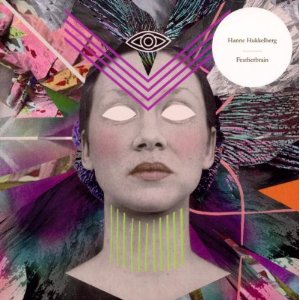Featherbrain brings Hukkelberg up to four albums, all of which seem to describe a protracted but unbroken journey to Somewhere. This new climate is the most hazardous yet: we’re out of the ice caverns of Blood From a Stone and into crumbling, vertiginous mountain paths and fields of thorns and tinder, and we still have yet to see our leader stumble. While from any other artist the odd lo-fi meandering-stroke-8-minute waffle would constitute weak points, Hukkelberg’s brazen confidence swells within each song till it’s airtight, impeccable. This self-assuredness is one of her distinguishing features as an artist, and indeed she sounds mightily distinguished.
The first and title track is a bait-n-switch: we find Hukkelberg tinkering around up by the machineheads, singing high and gummy for a good minute before hurtling downwards into a growl. Bass strings pant and grunt like two Micachu songs rutting. First blood is drawn. “Noah we’re coming after all, Noah we’ve changed our minds / No! Ah!” she wails on ‘Noah’, as the piano falls slow but unrelenting. ‘I Sing You’ manages to combine asthmatic cello with an ominously pedalled guitar for which my only cultural reference seems to be Soundgarden’s ‘Black Hole Sun’ (interpret that how you will). By ‘My Devils’, a chorus of Hannes are howling up a tempest, and the delicious rubbery timbre of her voice evokes Merrill Garbus adapting Greek tragedy. Darkness and space extend in all directions.
There is no discussing this in less epic terms. Our subject was a teenage doom metal vocalist; even when she returns to the Little Things of her debut album, nestling in thumb piano and kettles aboil, she could still conceivably be slaying a dragon with her free hand. Like, whatever.
This is what makes all this grandeur tolerable: for all this fitful odysseying around, Hukkelberg is never more than three paces from home. ‘The Bigger Me’ may sound like a forest, but it nevertheless clatters with teacups and saucepans and, at one point, the jingle of an incoming SMS. The infinite space of ‘The Time and I and What We Make’ is contained within the finite dimensions of her local church in Kongsberg, with father Sigurd manning the organ. In the end there is only muddy piano, the remarkable octogenarian singer Erik Vister, and Hukkelberg, whistling. Immense emotions becoming ineffably small.
You could even act real reductive towards Hukkelberg’s powers of reduction. You could say it sure is neat how she wrote a song for a Chronicles of Narnia film when her own music is such a whirlwind in a wardrobe. But I say to you, sir, that your analogy contains too few dragons. Dragons are the one true rating system, and Featherbrain is 100 percent dragons.


